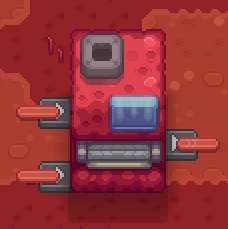Ribosome
| Ribosome | |
|---|---|
| Category | StructureProduction |
| Features | |
| Build req. | |
The ribosome is one of the basic
![]() intracellular
intracellular
structures and the first building needed to automate crafting. Its main purpose is to synthesize proteins from
Craft Recipe
Use
![]() You can set the recipe of the ribosome with the action key ('E' by default) or the context menu
You can set the recipe of the ribosome with the action key ('E' by default) or the context menu
![]() You will need to use
You will need to use
![]() pickers
oriented toward the ribosome to input items and oriented in the opposite direction for the output
pickers
oriented toward the ribosome to input items and oriented in the opposite direction for the output
Tips
![]() Ribosomes store up to 5 times the quantity of inputs needed as well as 5 times the output product
Ribosomes store up to 5 times the quantity of inputs needed as well as 5 times the output product
![]() You can set as many
You can set as many
![]() pickers
you want as inputs or outputs. Note that for output, the ribosome will prioritize them in the order you place them
pickers
you want as inputs or outputs. Note that for output, the ribosome will prioritize them in the order you place them
![]() You can manually input items in the ribosome
You can manually input items in the ribosome
![]() Removing the ribosome with the
Removing the ribosome with the
![]() destroy tool
will scatter stored items around it
destroy tool
will scatter stored items around it
![]() Switching recipe will destroy all stored items in the ribosome
Switching recipe will destroy all stored items in the ribosome
Craftable items
Enzymes
Proteins
Trivias[1]
Ribosomes are macromolecular machines, found within all cells, that perform biological protein synthesis. They consist of two major components: the small and large ribosomal subunit. Ribosomes uses messenger RNA to know in which order they will link amino acids together to form polypeptide chains. Even if ribosomes from other cells than the eukaryotes ones share similarities, showing a common ancestor, they display some difference in their structure. Thoses differences allows antibiotics to be able to kill bacteria by inhibiting their ribosomes while leaving human ribosomes unaffected.
